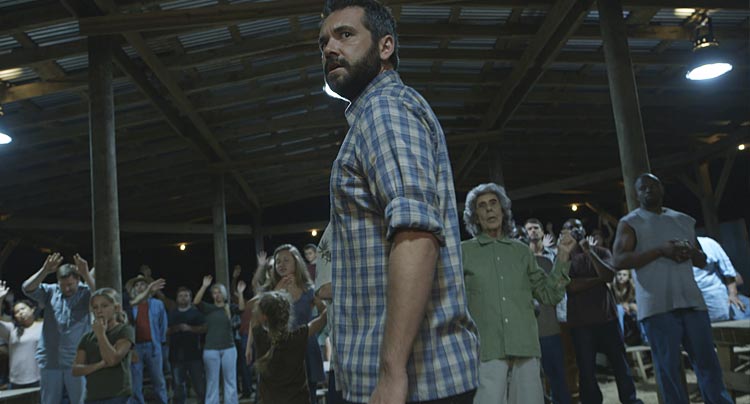
Documentary style horror with an unyielding lens makes for less scares and more anxiety.

Documentary style horror with an unyielding lens makes for less scares and more anxiety.
I’m a horror aficionado. I have watched everything from Melie’s Le Manoir du Diable, Nosferatu, The Cabinet of Dr. Caligari, and other early film depictions of the spectacular and creepy, to today’s special effects riddled gross-out filled shock-fests. My final thesis in film school focused on horror films and it’s easily my favorite genre. While it’s been fun to see horror transition into new things, such as The Blair Witch Project‘s popularization of found footage films, some experiments have been outside of what I enjoy about horror, such as torture porn revitalized in part by Eli Roth with his Hostel series. Roth is one of more than a dozen producers on The Sacrament, the latest from Ti West (The Innkeepers, The House of the Devil, V/H/S), and his influence isn’t heavy-handed but is certainly evident. But what’s different about The Sacrament isn’t a new horror style, but instead its distinct use of near-reality to disguise its horror.
For most of The Sacrament you will truly believe you are watching a documentary, albeit made by naïve journalists, about an atrocious historical event. Three Vice media journalists–one a photojournalist, one a video journalist, and the third an investigative journalist–travel outside the U.S to an undisclosed location. One of them, Patrick the photojournalist, has a sister who has recently written him about how she’s joined a commune after getting clean. Patrick fears for her safety and soundness of mind, while his editors see the chance at a potentially hot story. Upon their arrival outside of Eden Parish, the community his sister has joined, they are met with armed guards, immediately giving their trip an ominous feel and the environment one of distrust. They sort things out with Patrick’s sister, Caroline, and are granted admission into the community as well as the freedom to film. Patrick goes off with his sister while the two others, Jake and Sam, wander the commune interviewing those who will talk to them. Everyone speaks highly of their new life outside the U.S. in this veritable paradise, and ALL of them refer to ‘Father’, the man who made all of this possible.

They are allowed to interview ‘Father’ at the evening’s celebration and this is where the film begins its true tension. Father (Gene Jones) is the definitive charismatic cult-leader. He answers Sam’s questions with a distinct superiority and defensiveness for his ‘family’ and the safety of their home from the outside world. It’s at this point that anyone old enough to remember or know about the Jonestown massacre will feel the hair on the back of their necks raise. Father’s words sound eerily close to ones used by Jim Jones, leader of the People’s Temple cult and mass executioner of over 900 of his followers. But the similarities don’t stop there, and the inspiration for West’s film is so obvious it suddenly makes everything uncomfortably self-conscious.
In the end the film’s make-you-watch devices are what push the film over the edge, causing too much distress by the violence to satisfy the true horror film lover’s thrill-seeking addiction. The fun of horror, at least to this fan, is the roller coaster ride of fright and calm within a story. Without that sense of safety, the thrills can’t seem quite so thrilling. But there is rarely a moment of safety within The Sacrament, so the thrill becomes painful by the end. West’s forceful editing leaves nothing to the imagination, and he knows what Thomas Edison also knew way back in 1895 with The Execution of Mary Stewart, that one of the most ghastly charms of film is its ability to show everyone exactly what death can look like. Whether you want to see it or not.
Perhaps The Sacrament is just being promoted wrong. West’s straight-forward film and its historical similarities can’t help but be taken somewhat soberly, which strangely makes what happens on the screen even more frightening. Unfortunately it’s a kind of scare that feels irreverent, albeit thought-provoking. It will surely be a divisive film among critics, but this horror film lover will probably stick with her ghouls and psychopaths and choose actual documentaries for true-crime and history.